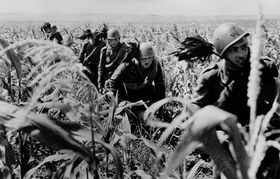Battle of Aubergand
| Battle of Aubergand | |||||||
|---|---|---|---|---|---|---|---|
| Part of the Asianna and the Pacific Campaign of the Second Europan War | |||||||
 Archadian Bersaglieri near a rice field, engaging Lorican troops | |||||||
| |||||||
| Belligerents | |||||||
| Commanders and leaders | |||||||
| Strength | |||||||
|
55,000 troops 347 tanks 155 armoured cars 75 guns 105 aircraft |
40,000 troops 217 tanks 122 armoured cars 90 guns 150 aircraft | ||||||
| Casualties and losses | |||||||
|
9,420 dead or wounded 207 tanks 49 guns 67 aircraft |
3,590 dead or wounded 95 tanks 37 guns 57 aircraft | ||||||
The Battle of Aubergand (14 October - 12 November 1943) took place in the Lorican-Bhutanian border. Seeing an opportunity to get back at the Imperials, Lorican and Federal troops decided to engage the Imperial forces while the Allied forces were engaging with the rest of the Imperial forces in Bhutania. The battle took the Imperials by surprise. However, Quenminese Marshal Thạch Hung Sõn Chiến ordered his Archadian counterpart, Marshal Victor Sazabio to immediately counter the attack.
In a controversial move, Chien denied Quenminese support for Sazabio in order to show his fighting tenacity. Despite awareness that the Loricans and Federals were slightly more modern than the Archadians, Sazabio fought and managed to route the attacking Federal forces. Against Chien's orders, Quenminese General Vương Thị Lệ sent a token force in order to support Sazabio's forces, who have already managed to force the Federals back.
Sazabio's strategy saved the Imperial lines from collapsing and prevented them from retreating to Kyachindwin. Despite it, the Imperials were forced to retreat from Bhutania after the Battle of Trashigang by the end of the year.